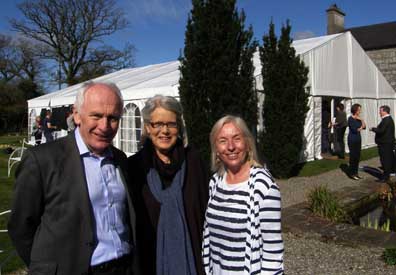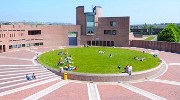Creating Employment from our Food Heritage

Published on: Saturday, 20 April 2013
Further details from: margaret.linehan@cit.ie
How can we learn from our Food Heritage to create employment for this generation?
A symposium on creating employment from our food heritage was organised by Darina Allen, Ballymaloe Cookery School; Dr Margaret Linehan, CIT; Christopher Bielenberg, Sandbrook House; and Donal Lehane of Slow Food Ireland. The symposium took place in Sandbrook House, Co Carlow on Saturday 20 April. Keynote speakers addressed various topics including: sustainable agriculture, food history through Irish culinary manuscripts, and influencing our lifelong food habits. The symposium organisers were very heartened by the ideas which were generated and it is hoped that this symposium will be the start of further discussions with Government and policy makers.
CIT Bachelor of Business in Culinary Arts students, Joe McNamee and Hazel Bourke presented a research paper on behalf of their Culinary Arts class. The research for the study was conducted with Culinary Arts Lecturer, JJ Healy, Department of Tourism and Hospitality, CIT.
The title of the research paper was A Study of Irish Food Culture before the Arrival of the Potato. The findings from the research illustrated that the Irish population did have a very varied, healthy and nutritious diet before the arrival of the potato. The wealthier class had access to a greater range and choice of food and produce, but, even the poor and the peasant classes were able to enjoy a substantial and varied diet, mixing both cultivated and foraged foodstuffs. The importance of foraging, both coastal and inland was highlighted.
The arrival of the potato had a striking impact as it provided the basis for a cheap but nutritious diet. However, a large section of the Irish population became over-dependent on the potato as a primary food resource by the time of the Great Famine and many of the old traditional maritime resources and knowledge of their usage had fallen away. Meat and grain continued to be produced in abundance during the time of the Great Famine, but, would not have been available to the peasant classes and this section of the population did not appear to have retained any of the knowledge of cheap or even free foraged foodstuffs. Even when they were aware of the potential bounty, such as food from the sea, they either lacked the nautical ability or knowledge to fish, or no longer possessed the required equipment.
The paper also suggests that it is rather ironic that the first generation to begin to truly reclaim the knowledge, and culinary skills and techniques for using cheaper foraged wild foods, and to begin to disseminate it across the wider food culture, and celebrate it as food of the highest order is this one, a generation that despite the vicissitudes of the recent recession remain the wealthiest ever to reside in Ireland. This new interest in the original food culture that existed before the arrival of the potato leads to some potentially very exciting possibilities for the future of Irish food.
Finally, the paper observes that we are still at a comparatively early stage in recognising and beginning to develop our own version of what is a massively growing market in world tourism – gastro tourism. Tourism is, and has been, for generations one of our biggest sources of revenue but we are only now realising the potential value of giving tourists what he or she wants to eat most when visiting Ireland – genuine Irish food. A cuisine that is native to Ireland and that is unique to Ireland, and would add hugely to the €2bn – the current annual amount spent on food by visitors to this country.This would be of major financial benefit for a sector that has struggled in recent years.

Adrian Gregan, Head, Department of Tourism & Hospitality, CIT; Darina Allen, Ballymaloe Cookery School; and Dr Margaret Linehan, Head, School of Humanities, CIT.






